
Acta Baltico-Slavica
Scope & Guideline
Engaging with Cutting-Edge Research in Slavic Studies
Introduction
Aims and Scopes
- Linguistic Studies:
The journal publishes research on various aspects of linguistics, including dialect studies, language contact, bilingualism, and the evolution of language within specific cultural contexts. - Cultural Interactions:
Acta Baltico-Slavica emphasizes the cultural exchanges between Baltic and Slavic nations, exploring themes of identity, memory, and narrative construction through literature and the arts. - Historical Contextualization:
The journal aims to provide historical insights into the socio-political dynamics of the Baltic and Slavic regions, examining how history shapes contemporary cultural and linguistic landscapes. - Regional Identity and Memory:
A core focus is on how regional identities are formed and expressed, including studies on folklore, urban memory, and the impact of historical events on cultural narratives. - Interdisciplinary Approaches:
The journal encourages interdisciplinary research that combines linguistics, literature, history, and cultural studies to provide a holistic understanding of the issues at hand.
Trending and Emerging
- Digital Ethnography and Online Identity:
Research on the impact of the internet and digital platforms on ethnic identity is gaining traction, reflecting the importance of online communities in contemporary cultural discourse. - Urban Studies and Cultural Heterotopia:
Emerging themes focus on urban spaces as sites of cultural production and memory, examining how literature and art reflect and shape urban identities and experiences. - Transnational Perspectives:
There is an increasing interest in transnational studies that explore cross-border interactions and influences among the Baltic and Slavic countries, emphasizing the interconnectedness of these regions. - Memory Studies:
The examination of memory, particularly how historical narratives are constructed and remembered in contemporary culture, is a growing focus, indicating a shift towards understanding identity through the lens of memory.
Declining or Waning
- Traditional Folklore Studies:
Research centered on traditional folklore has decreased, possibly due to a shift towards more contemporary cultural studies that focus on modern identity and urban narratives. - Historical Linguistics:
There is a noticeable decline in papers dedicated to purely historical linguistics, as the journal increasingly favors studies that connect language to broader cultural and social themes. - Soviet-era Historiography:
While initially a prominent theme, studies specifically analyzing Soviet-era historiography are becoming less frequent, perhaps as researchers explore more diverse perspectives beyond the Soviet narrative. - Minority Language Studies:
Topics focused on minority languages within the context of the Baltic and Slavic regions have waned, possibly due to a growing emphasis on bilingualism and language management in broader contexts.
Similar Journals

Sibirskii Filologicheskii Zhurnal
Cultivating Knowledge in Cultural Studies and LinguisticsSibirskii Filologicheskii Zhurnal is a prestigious academic journal published by the Russian Academy of Sciences, Institute of Cytology and Genetics. With ISSN 1813-7083, it is dedicated to advancing research in the fields of Cultural Studies, Linguistics and Language, and Literature and Literary Theory, and has achieved notable rankings, including Q2 in Cultural Studies and Linguistics, and Q1 in Literature for 2023. The journal provides a platform for scholarly discourse, contributing valuable insights to its fields with an evolving scope that spans from 2018 to 2024. Though not an open-access journal, Sibirskii Filologicheskii Zhurnal serves as a vital resource for researchers, professionals, and students in the Russian Federation and beyond, fostering a deeper understanding of linguistic and literary phenomena. Its commitment to high-quality content makes it an essential addition to any academic's library.

Studia z Filologii Polskiej i Slowianskiej
Pioneering Research in Slavic Linguistic PhenomenaStudia z Filologii Polskiej i Slowianskiej is a prominent journal published by the Polish Academy of Sciences, Institute of Slavic Studies, focusing on the rich and diverse field of linguistics and language studies, particularly within the Slavic context. With the ISSN 0081-7090 and E-ISSN 2392-2435, this open-access journal has been a valuable resource for researchers, professionals, and students since its transition to an open-access model in 2014. It features rigorous peer-reviewed articles that contribute to the understanding of linguistic phenomena and cultural narratives across Slavic languages. Recognized within the Q3 quartile of linguistics and language in 2023, it ranks at the intersection of arts, humanities, and social sciences, providing insights that echo through disciplines such as sociolinguistics, psycholinguistics, and philology. In its ongoing publication trajectory from 2011 to 2023, Studia z Filologii Polskiej i Slowianskiej continues to foster academic discourse and collaboration, positioning itself as a key player in the global linguistic community.
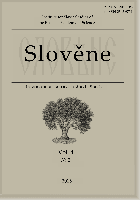
Slovene-International Journal of Slavic Studies
Cultivating Knowledge Across Slavic BordersThe Slovene-International Journal of Slavic Studies, published by the Russian Academy of Sciences, Institute of Slavic Studies, serves as a vital platform for scholarly discourse in the fields of Cultural Studies, History, Linguistics, and Religious Studies. Since its transition to Open Access in 2012, the journal has enriched academic dialogue, enabling wider circulation and accessibility of research findings. Based in the Russian Federation, the journal supports interdisciplinary approaches, inviting contributions that push the boundaries of traditional Slavic studies. With a commendable ranking in the Q3 quartile across multiple categories as of 2023 and respectable Scopus rankings, it stands out as a crucial resource for researchers and students alike, enhancing their understanding of Slavic and related cultural contexts. The journal's commitment to fostering international collaboration and dialogue positions it as an invaluable asset for anyone engaged in the complexities of Slavic studies.

Slavia Meridionalis
Connecting minds across Anthropology, Linguistics, and Literature.Slavia Meridionalis is a distinguished open-access journal published by the Polish Academy of Sciences, Institute of Slavic Studies, dedicated to advancing scholarly discourse in the fields of Anthropology, Cultural Studies, History, Linguistics and Language, and Literature and Literary Theory. With its ISSN 1233-6173 and E-ISSN 2392-2400, this journal has made significant strides in promoting research since its inception in 2014. Operating from Warsaw, Poland, Slavia Meridionalis aims to serve as a pivotal platform for researchers and students alike, fostering interdisciplinary collaboration and knowledge dissemination. The journal holds respectable rankings in its various categories, some achieving Q3 status, which reflects its commitment to quality scholarship within the academic community. By providing open access to its readership, Slavia Meridionalis ensures that pivotal research is readily available for the global audience, thus enhancing its relevance and impact across diverse fields.
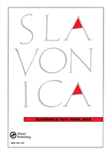
SLAVONICA
Bridging Historical Insights with Contemporary PerspectivesSLAVONICA is a distinguished academic journal dedicated to the exploration and analysis of Slavic studies, incorporating a wide array of cultural, historical, and linguistic perspectives. Published by Routledge Journals, Taylor & Francis Ltd, this journal serves as a critical platform for interdisciplinary scholarship, emphasizing the dynamic nature of Slavic cultures and languages. Though it currently does not offer Open Access, SLAVONICA is an important resource for researchers, professionals, and students seeking to engage with the latest academic discourse in the fields of Cultural Studies, History, Literature, and Linguistics, achieving a recognized place in the Q4 quartile across several categories as of 2023. With coverage spanning from 1994 to 2024, and its commitment to fostering academic inquiry, SLAVONICA plays a vital role in elevating the understanding of Slavic heritage and contemporary issues, making it essential reading for anyone interested in the complexities of this region.
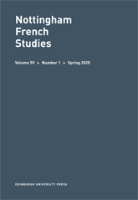
NOTTINGHAM FRENCH STUDIES
Fostering Interdisciplinary Dialogue in French StudiesNOTTINGHAM FRENCH STUDIES is a distinguished academic journal published by Edinburgh University Press, focusing on the diverse realms of French language, literature, culture, and history. With its ISSN 0029-4586 and E-ISSN 2047-7236, the journal serves as a vital platform for scholarly discourse, featuring interdisciplinary research that bridges gaps between Cultural Studies, Linguistics, and Literary Theory. Notable for its robust performance, it holds a Q3 ranking in Cultural Studies and Linguistics and a Q2 ranking in Literature and Literary Theory as of 2023, placing it among the key publications within its field. Throughout its publication span from 1996 to 2024, NOTTINGHAM FRENCH STUDIES has consistently catered to the academic community with insightful articles, enriching the understanding of French cultural contexts. While it is not an Open Access journal, its contributions are pivotal in advancing scholarly dialogue and fostering critical perspectives, making it an essential resource for researchers, professionals, and students engaged in French studies and its interdisciplinary connections.
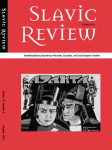
SLAVIC REVIEW
Advancing Knowledge in Slavic Cultural and Social Dimensions.SLAVIC REVIEW, published by Cambridge University Press, is a prominent academic journal that delves into the rich tapestry of Slavic studies, focusing on the cultural, historical, and social dimensions of Slavic regions. With an ISSN of 0037-6779 and an E-ISSN of 2325-7784, this journal holds a significant position within the academic community, ranking in the Q2 category of Arts and Humanities (miscellaneous) and achieving a Q1 rating in Cultural Studies as of 2023. Notably, the journal has consistent relevance in the field, as evidenced by its Scopus rankings—Rank #260 in Cultural Studies and Rank #204 in Miscellaneous Arts and Humanities. Since its converged years starting from 1966 up to the present, SLAVIC REVIEW has been an essential resource for researchers, professionals, and students aiming to deepen their understanding of Slavic cultures. While it operates on a traditional subscription model and does not provide open access, the journal remains a vital platform for pioneering research and critical discourse in Slavic studies.

Zbornik Matice Srpske za Slavistiku-Matica Srpska Journal of Slavic Studies
Unveiling the Richness of Slavic Languages and LiteraturesZbornik Matice Srpske za Slavistiku - Matica Srpska Journal of Slavic Studies, published by Matica Srpska in Serbia, is a prominent academic journal focusing on the diverse and rich field of Slavic studies. With an ISSN of 0352-5007 and a commitment to advancing knowledge in linguistics, literature, and cultural contexts, this journal serves as a vital resource for researchers, professionals, and students alike. Although designated as an open access journal, its significance is highlighted by its ranking in the lower quartiles of 2023 across various categories, including Q4 in Linguistics and Language and Q3 in Literature and Literary Theory. The journal's Scopus rankings further reflect its position, with a percentile of just 8th for Language and Linguistics. These factors underscore the journal's ongoing contribution to Slavic scholarship from 2019 to 2024, fostering dialogue and exploration in a field that remains crucial for understanding Eastern European cultures and languages.

Slovo
Navigating the Dynamic Landscapes of Slavic ScholarshipSlovo, published by the University College London, School of Slavonic & East European Studies, is a vital scholarly journal dedicated to the exploration of Slavic languages and cultures, as well as the broader social sciences and humanities. Established with a commitment to advancing academic discourse, Slovo serves as a platform for researchers, professionals, and students interested in the dynamic intersections of literature, history, and cultural studies within Slavic and Eastern European contexts. Although it holds a Q4 ranking in both the Arts and Humanities and Social Sciences categories, the journal’s emphasis on fresh perspectives often invites innovative contributions that challenge conventional narratives. While lacking an Open Access option, Slovo remains integral for those seeking to navigate its multifaceted terrain, ensuring that emerging scholars and established academics alike can engage with rigorous research from 2012 to 2023 and beyond. With its headquarters in London, United Kingdom, this journal not only reflects the rich heritage of its academic lineage but also fosters a vibrant community committed to the exploration of Slavic and East European studies.
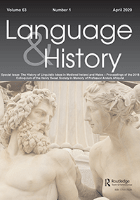
Language & History
Fostering Dialogue Between Linguistics and HistoryLanguage & History is a distinguished journal published by Routledge Journals, Taylor & Francis Ltd, focusing on the intersection of linguistics and historical context. With an ISSN of 1759-7536 and an E-ISSN of 1759-7544, this journal serves as a vital platform for scholars exploring the dynamic relationship between language evolution and historical narratives. It is recognized for its contributions to the field, holding a Q2 ranking in Linguistics and Language for 2023, reflecting its esteemed position among peer publications. Indexed in Scopus with notable rankings in both Arts and Humanities and Social Sciences, Language & History aims to foster innovative research, shed light on language change, and encourage cross-disciplinary dialogue. The journal operates without open access, providing rigorous peer-reviewed content for researchers, professionals, and students alike, ensuring that cutting-edge studies remain at the forefront of linguistic research. Published biannually, it continues to attract a diverse array of contributions that enrich the understanding of language within historical contexts, making it an essential resource in the academic community.